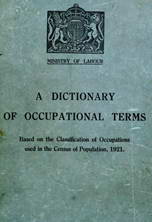A Dictionary of Occupational Terms Based on the Classification of Occupations used in the Census of Population, 1921.

ORDER XXVII.—PERSONS ENGAGED IN PERSONAL SERVICE (including Institutions, Clubs, Hotels, etc.)
917.—Hall and Hotel Porters; Doorkeepers and Carriage Attendants
Back to List of Occupational Codes
- door attendant
; hall man, hostel attendant, lobby boy or man, hall porter
- guards public entrance to prevent entry of unauthorised persons; opens and closes door, receives visitors or clients; (in hotels, etc.) sees to luggage, carries it to bedrooms or directs other porter or boy to do so; replies to telephone calls, posts letters left for post collection; duties vary according to size of establishment.
- doorboy
- as for page (900).
- doorkeeper
- is employed at entrance to offices, etc., to direct visitors to officials, etc., required, and to keep out unauthorised persons.
- doorman (cinema)
- stands at entrance to cinema, preserves order in entrance hall, directs clients; cleans brasswork, etc., and does other odd jobs when cinema is closed to public.
- hall boy
- as for page (900).
- hallman, lobby boy or man
- see door attendant.
- night watchman (hydro)
- see porter, night.
- porter, club
- as for door attendant.
- porter, college
- is in charge of gate at a college, answers enquiries; at resident colleges, locks gates at fixed hour; takes names of students entering late.
- porter, day
- see porter, hotel.
- porter at flats
- see porter, resident.
- porter, hall
- see door attendant.
- porter, head
- is in charge of porter staff in large hotel, club or private establishment; supervises and allocates work; responsible for discipline.
- porter, head (hospital)
- supervises work of hospital porters (929) (q.v.) and is responsible for their work and conduct; reports cases of misconduct or unsatisfactory work on part of porters to office; keeps record of cases coming into hospital, and sometimes assists in clerical work of office; on ceremonial occasions, leads procession of Governors making tour of inspection of hospital; is usually employed on duties similar to those of hospital porters, e.g. answering inquiries, and directing visitors or patients to wards or departments, answering telephone, ani delivering messages by telephone, calling doctors, posting and sorting letters, carrying patients to wards or to the operating theatre.
- porter, hotel
; day porter
- acts as general porter, and carries guests' luggage in and out, up to rooms, etc.; in small hotels, may also perform odd domestic duties, e.g. carrying coals, denning brass-work, cf. luggage porter (759).
- porter (lodging)
- opens door, attends to messages, and guards main entrance to lodging house to prevent entry of unauthorised persons; may also clean premises, except bedrooms.
- porter, night
; night watchman (hydro)
- attends to hotel visitors during night, acts as watchman, receives late arrivals, and arranges for their accommodation; in large establishments supervises cleaning (main hall, staircase, public rooms) done during night.
- porter, resident
; porter at flats
- a resident official in charge of residential dwellings, on behalf of proprietor; keeps keys of vacant flats, answers enquiries; is responsible for care and cleanliness of property; sees to central heating, etc.
- porter, school
- a responsible man, employed at school, entrusted with miscellaneous duties which vary as between schools, such as keeping the gate, ringing the bell at certain hours, waking dormitories, issuing stationery, putting lights out and locking up buildings at night.
- porter, station
- meets trains and conveys luggage of visitors to and from hotel; cf. outside porter (759).
- porter, stores
- supplies and conveys from stock stores to the various departments of a large hotel.
- postman, private
- carries letters and parcels between post office and hotel, sees to despatch of letters in hotel boxes and attends to general postal requirements of hotel visitors.
Back to List of Occupational Codes
From:
A Dictionary of Occupational Terms Based on the Classification of Occupations used in the Census of Population, 1921,
Ministry of Labour, 1927. Digitised by Peter Christian, August, 2016. This text is in the Public Domain. 
